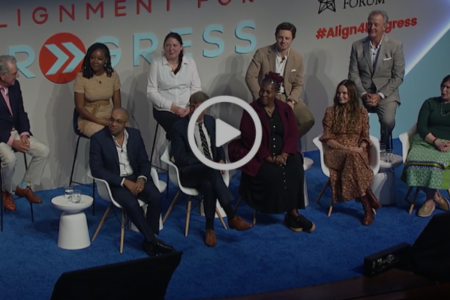Most Americans have experience with mental health and/or substance use disorders (MH/SUDs). At The Kennedy Forum, we believe that behind these conditions are complex human beings who bring their own struggles, talents, dreams, and power.
At the 2024 Alignment for Progress conference, we invited individuals highlighted in “Profiles in Mental Health Courage,” co-written by our Co-Founder Patrick J. Kennedy and journalist Stephen Fried, to highlight the personal stories that are too often the result of policy failures.
In the audience at the event, leaders across the public and private sectors heard firsthand why we must aim for a bold vision for widespread prevention and screening, evidence-based treatment, and supported recovery. Here are a few core truths we heard:
Silence and Stigma Are Still Issues Harming Individuals with MH/SUD
Though awareness of MH/SUD conditions has improved over time, a lack of understanding still hinders treatment and recovery.
Naia, an aerospace engineering student, was once committed to a psychiatric hospital, which felt like “the end of her world.”
“As you would imagine there is quite a stigma and discouragement for people to seek mental health treatment as it will end up on a record,” Naia said. “There are other flight-adjacent careers where people feel the same stigma and they don’t seek help, and they end up taking their own lives.”
Stigma can also create environments where silence and unnecessary suffering are all too common.
Ashley, for instance, first experienced auditory hallucinations as a teenager, and she subsequently turned to different substances to dull the effects of the voices and feelings of depression.
“My whole life I’ve been self-medicating from a disease that I didn’t know was a disease,” Ashley told the audience. “I didn’t know in my adolescence that it was something out of the norm, so I didn’t know how to communicate it.”
Miss Tonie, another profile, echoed the sentiment. “I was the last person to know that there was a problem for me.”
After a 25-year addiction during which Miss Tonie was “in and out of prisons, jails and psychiatric facilities,” she now uses her experiences to help others. “I advocate every day for addicts that are still suffering because you no longer have to suffer in silence,” she said.
While advocates like Miss Tonie are vital, on a national level, we need better to policy to identify and treat issues before they worsen.
We Need Systemic Solutions for Better MH/SUD Treatment
Gene lost his son Tom at 52 to the “chronic, dreadful disease called alcoholism.” Despite 10 years of treatments, including medication and psychotherapy, none worked for “Tommy,” as Gene sometimes calls him.
“Tommy’s not alone,” Gene told the crowd. “Of the 40 million people who are suffering with addiction, the recovery rate is 6%.”
In some communities, effective treatment is even further out of reach. Philomena, a profile who serves as the Economic Development Coordinator for the Bad River Band of Lake Superior Chippewa Indians, explains how pernicious the issue is.
“In Black communities, in Native communities across the country … we don’t have access to effective treatments and our communities are drained of the resources and the talent because they are in jails and prisons,” she said. “We need to be empowering the people that we’ve been putting down.”
Without culturally competent, evidence-based treatments, the U.S. health care system is failing individuals and entire communities. Fortunately, there are solutions. Our experts have outlined the federal policy changes necessary for moving the needle on mental health outcomes and using better research and technology to improve lives
Recovery Takes Time — and Support
Recovery isn’t linear, immediate, or achieved within a silo.
Like many with MH/SUD, Gabrielle told the audience that she was “mismedicated” or misdiagnosed for most of her life, but her now-husband offered her an ultimatum: figure out the pharmaceuticals, or he would leave.
“Thanks to my husband, I feel cured, if I dare say such a thing,” Gabrielle said. “I feel a sense of balance, after 14 years of trial-and-error and balancing medications with the milligrams and the brand and trying to make the status quo feel safe. It’s the first time I’ve felt safe.”
Unfortunately, families are often not aware of or included in recovery, as our Co-Founder Patrick J.Kennedy knows all too well.
“I’ve been in therapy my whole life and never had anyone say, ‘who are the important people around you and what can we do to empower them to help you?’” Patrick said. “That’s an evidence-based intervention that [the system] never pays for, that could be so monumental in people’s recovery, if we empower their family members to be more supportive.”
Mark, whose son Harry died by suicide, is still relying on his support system to deal with the issues that led to Harry’s loss. “I tell people, don’t let anybody tell you how to grieve. It’s yours. Let it flow over you. There’s no playbook. It’s all OK as long as you have a great support system.”
While family, friends, teachers, and colleagues are important players in the support system, our nation is missing structural support for those dealing with MH/SUD. This is why we have outlined the promising recovery strategies to help people down the path of healing.
To transform the health care system to support individuals with system-wide solutions for MH/SUDs, The Kennedy Forum is pursuing the Alignment for Progress 90-90-90 vision. If you would like to support this critical work, please consider donating today or making a commitment to join the cause.

